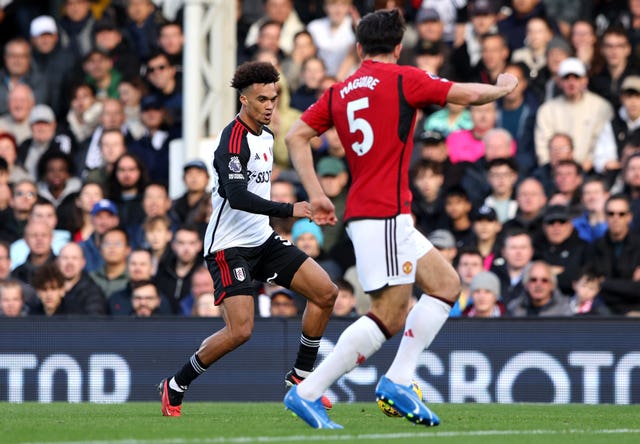
Brain injury charity Headway have questioned the decision to allow Harry Maguire to continue playing for Manchester United after sustaining a head collision and warned about the management of in-game impacts in football.
Maguire fell to the floor with less than a minute played at Fulham on Saturday after clashing heads with Rodrigo Muniz and appeared to have sustained a cut just above his eye.
The England defender continued after treatment but referee John Brooks questioned Maguire’s condition after 58 minutes and United physios again analysed the defender.
Another courageous display from @HarryMaguire93 💪#MUFC || #FULMUN pic.twitter.com/KRtOFz6lgB
— Manchester United (@ManUtd) November 4, 2023
Maguire finished the game United as won 1-0, and he later told MUTV he had passed concussion protocols, saying: “The doctor did all the tests, I knew where I was and I was answering all the questions and I completed them (protocols) thankfully.”
But Headway say the sight of Brooks’ intervention when Maguire appeared to be in difficulty was “deeply concerning”, and the organisation has warned that progress made over the past decade to improve the health of players is at risk due to football’s failure to manage in-game head injuries.
“The incident with Harry Maguire is concerning for a number of reasons,” said Luke Griggs, chief executive of Headway.
“An opponent’s shoulder strikes the side of his head; minutes later he goes down on his haunches, showing clear signs of discomfort.
“After a brief on-pitch assessment – again highlighting the nonsensical lack of temporary concussion substitutes in football – he was allowed to continue.
“The sight of the referee then having to intervene in the second half when the player continued to look in difficulty was deeply concerning. But again, after another brief assessment with medics, he was again allowed to play on.
“We are not privy to the discussions with his medical team, nor should their professionalism be questioned. This is an issue with the very culture of football and its stubborn refusal to put players’ health above all else – including the result of a game.
“Every time the ‘if in doubt, sit it out’ principle is seen to be ignored in elite level football, our chances of educating younger players and better protecting future generations from short and long-term brain injury is diminished.
“Temporary concussion substitutions would immediately help return some credibility to the process, but an evolution of attitude is urgently needed.”
Griggs said attitudes to concussion have changed over the past decade.
 Harry Maguire (right) played the full game against Fulham on Saturday after suffering a head injury in the first minute at Craven Cottage (Kieran Cleeves/PA)
Harry Maguire (right) played the full game against Fulham on Saturday after suffering a head injury in the first minute at Craven Cottage (Kieran Cleeves/PA)
He said: “We have come such a long way since Hugo Lloris was labelled a ‘hero’ for over-ruling club medics to return to the pitch after a clear concussion while playing for Spurs against Everton in 2013.
“That shocking incident was a wake-up call for football. We called it ‘dangerous and irresponsible’ at the time, demanding it be used as a catalyst for change.
“That change has been a slow process, but attitudes have changed. Promises were made, such as the concept of players being immediately removed from play if there is any suspicion of concussion.
“An ‘if in doubt, sit it out’ approach was enshrined in a series of concussion protocols, eventually adopted by various footballing bodies.
“But this progress is eroded with every high-profile incident in which the safety first principle is set aside and players being allowed to continue despite showing signs that a concussion could have occurred.”


Why are you making commenting on The Herald only available to subscribers?
It should have been a safe space for informed debate, somewhere for readers to discuss issues around the biggest stories of the day, but all too often the below the line comments on most websites have become bogged down by off-topic discussions and abuse.
heraldscotland.com is tackling this problem by allowing only subscribers to comment.
We are doing this to improve the experience for our loyal readers and we believe it will reduce the ability of trolls and troublemakers, who occasionally find their way onto our site, to abuse our journalists and readers. We also hope it will help the comments section fulfil its promise as a part of Scotland's conversation with itself.
We are lucky at The Herald. We are read by an informed, educated readership who can add their knowledge and insights to our stories.
That is invaluable.
We are making the subscriber-only change to support our valued readers, who tell us they don't want the site cluttered up with irrelevant comments, untruths and abuse.
In the past, the journalist’s job was to collect and distribute information to the audience. Technology means that readers can shape a discussion. We look forward to hearing from you on heraldscotland.com
Comments & Moderation
Readers’ comments: You are personally liable for the content of any comments you upload to this website, so please act responsibly. We do not pre-moderate or monitor readers’ comments appearing on our websites, but we do post-moderate in response to complaints we receive or otherwise when a potential problem comes to our attention. You can make a complaint by using the ‘report this post’ link . We may then apply our discretion under the user terms to amend or delete comments.
Post moderation is undertaken full-time 9am-6pm on weekdays, and on a part-time basis outwith those hours.
Read the rules here